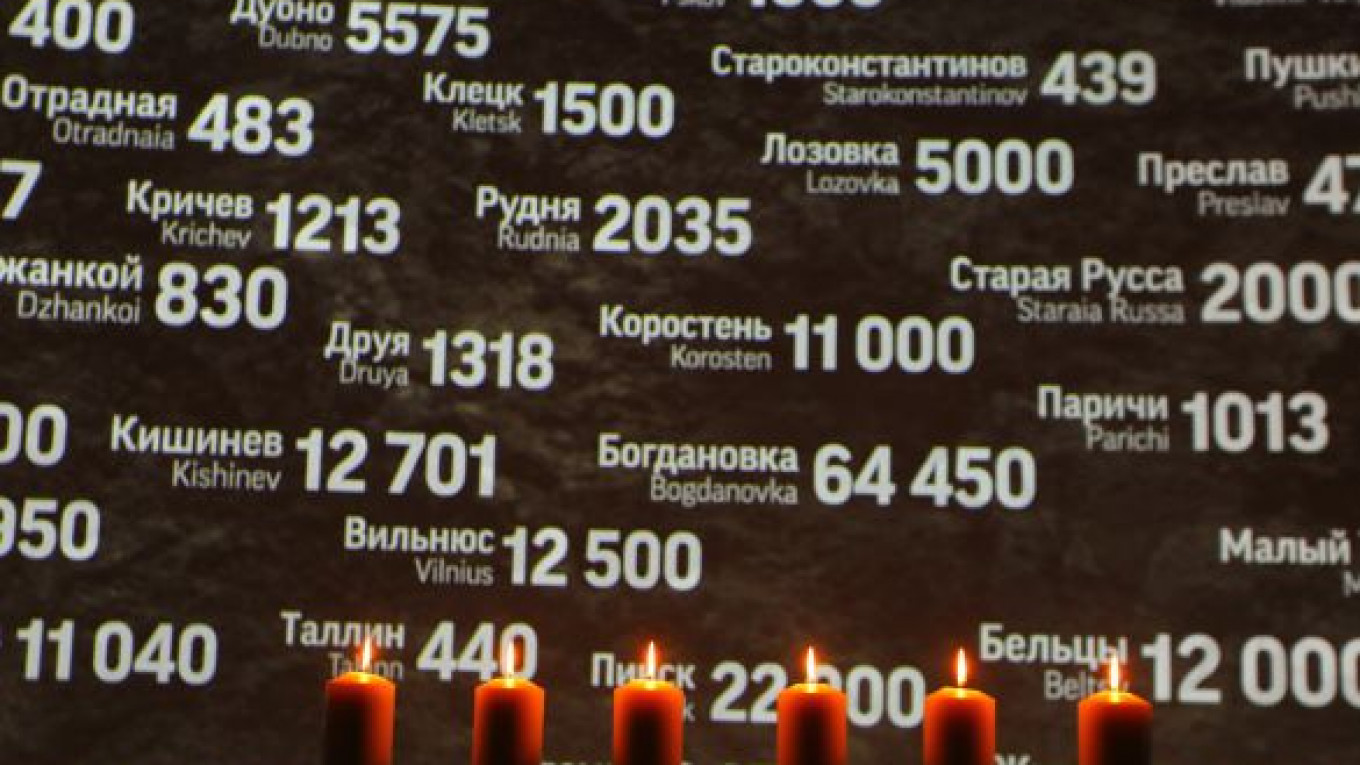Moscow's new Jewish Museum will commemorate International Holocaust Remembrance Day on Monday for the second year running with a candle-lighting ceremony attended by Holocaust survivors, foreign diplomats and government representatives.
"It commemorates the day that the Red Army liberated Auschwitz and freed the Jews who were still held there," said Rabbi Alexander Borod?°, head of the Federation of Jewish Communities of Russia, or FEOR, speaking of the holiday. Boroda, who will lead the ceremonies at the Jewish Museum, said the holiday was intended "as a memorial to the suffering of the Jewish people, and to ensure that such a thing does not happen again."
While various countries have had their own Holocaust remembrance holidays since shortly after the end of World War II, International Holocaust Remembrance Day is actually a fairly recent creation, made official by a United Nations resolution in 2005. While FEOR has observed the day of remembrance since its creation, this will only be the second year that ceremonies have been held in Moscow's new Jewish Museum.
The Jewish Museum, which opened in 2012 with generous support from wealthy donors like Russian businessman Viktor Vekselberg, is thought to be the largest Jewish Museum in the world, and stands out for its extensive use of interactive technology. The museum does not focus solely on Jewish history but also includes the attached Center for the Avant-Garde, which has organized special exhibits of modern art, including some highlights of the 5th Moscow Biennale such as the exhibit "Foreigners Everywhere," a selection of pieces from the collection of Eduard Pomeranz.
The museum does have a large section devoted to the Holocaust, an important tool for remembering an event that few living people remember. Boroda said that there were perhaps a few thousand living Holocaust survivors in Russia, though the number decrease every year. He added that the majority of those who remained were young children during World War II.
Boroda said life for Jews in Russia had greatly improved since the fall of the Soviet Union. "There has not been anti-semitism in the government for the last 20 years, since perestroika, and every day anti-semitism has also declined." Part of this decline was due to the reduction in the number and spread of the Jewish population, Boroda said, but also stemmed from good relations with the Orthodox Church and Muslim authorities.
Rabbi Aharon Gurevich, Russia's first Chief Military Rabbi since the Bolshevik Revolution, confirmed that anti-Semitism was at an all-time low in Russia. Gurevich, who is responsible for responding to anti-Semitic incidents for FEOR, noted that the number of anti-Semitic attacks had been at record lows the last two years, and expected that it would continue to decline.
While huge numbers of Russian Jews emigrated to Israel and the U.S. in the '80s and '90s, Boroda said that this mass exodus had largely ceased. Apart from a desire to move to Israel, economic uncertainty and fear of nationalist anti-semites were major causes for emigration, and both of these factors have declined significantly.
In fact, Boroda cautiously said that Russia's Jewish community was finally growing again, albeit slowly. Some of the families that emigrated during perestroika have begun returning to Russia, attracted by the more familiar culture and stabilized economic conditions, while many people who never considered themselves Jewish during the Soviet era have reconnected with their roots and begun to practice the religion actively.
While Boroda was optimistic about the future of Russia's Jewish community, he cautioned that the Holocaust could repeat itself in the modern world. "Globally, the problem of the Holocaust is incurable — we see in many countries at critical times, moments of instability … there are attempts to put the blame for problems on minorities — if these people come to power, they are fully capable of putting their ideas into practice."
The commemorative candle-lighting ceremony will take place Monday at 12 p.m. at the Jewish Museum, 11 Ulitsa Obraztsova, Bldg. 1A, Metro Marina Roshcha.
Contact the author at g.golubock@imedia.ru


